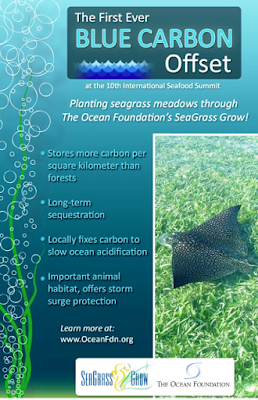As a member of the International Advisory Board of the Ocean Foundation it gives me great pleasure to announce that the Ocean Foundation is offering the first Blue Carbon offset possibility.
The Foundation's SeaGrass Grow! project will be used to offset greenhouse gas emissions from the core activities of the 2012 International Seafood Summit. Seafood Choices to be held in Hong Kong from the 6th to 8th September. http://www.seafoodsummit.org
As such, the 2012 International Seafood Summit is a premier, global stage-setting opportunity for advancing blue carbon, an exciting and emerging concept that addresses climate change and promotes marine conservationhttp://goo.gl/oaxKD
The natural coastal ecosystems of seagrasses, tidal marshes, and mangroves take up and sequester large quantities of carbon. If these ecosystems are degraded or damaged by human activities, their capacity as carbon sinks is lost.
However, there are many questions to be answered before the opportunity that blue carbon systems can be fully evaluated. For example, how much carbon do coastal ecosystems store compared to other ecosystems? Are carbon storage rates different in different parts of the ocean? And based on this, how economical are investments in blue carbon ecosystem options for climate mitigation? Does it have a place in the potential carbon markets? Could preserving blue carbon options also significantly contribute to promoting habitat protection and thus biodiversity?
The Ocean Foundation and others are investing in finding answers to these questions, and are beginning to get results. Confirmation of key blue carbon attributes includes:
Seagrass ecosystems store more carbon per square kilometer than forests.
Seagrass meadows can protect nearby coral reefs and other calcifying organisms, including mollusks, from the effects of ocean acidification.
To jump-start this cutting edge focus on natural coastal ecosystems, The Ocean Foundation created SeaGrass Grow! to restore seagrass habitat that offers protection from storms and prevention of shoreline erosion, and also locally fixes carbon (to slow ocean acidification) and stores carbon (with long-term sequestration). Healthy seagrass meadows also support tourism, food security, and both commercial and recreational fishing. And, in addition to providing nurseries for fish, seagrass meadows also offer grazing opportunities for endangered sea turtles, manatees, and dugongs.
In conjunction with its work to restore lost and damaged seagrass meadows, The Ocean Foundation also works to preserve blue carbon across the globe. The Ocean Foundation hosts the Blue Climate Coalition, which seeks enhanced international recognition of the opportunities to certify carbon credits in coastal carbon ecosystems, and facilitate the inclusion of the carbon value of coastal ecosystems in the accounting of ecosystem services. Thus, The Ocean Foundation will, in the future, offer real and permanent emissions offsets that are credible, and carbon sequestration that is verifiable. Presently The Ocean Foundation is “banking” the square kilometers of restoration in anticipation of certification, and, thus will also have developed a network of demonstration projects.
